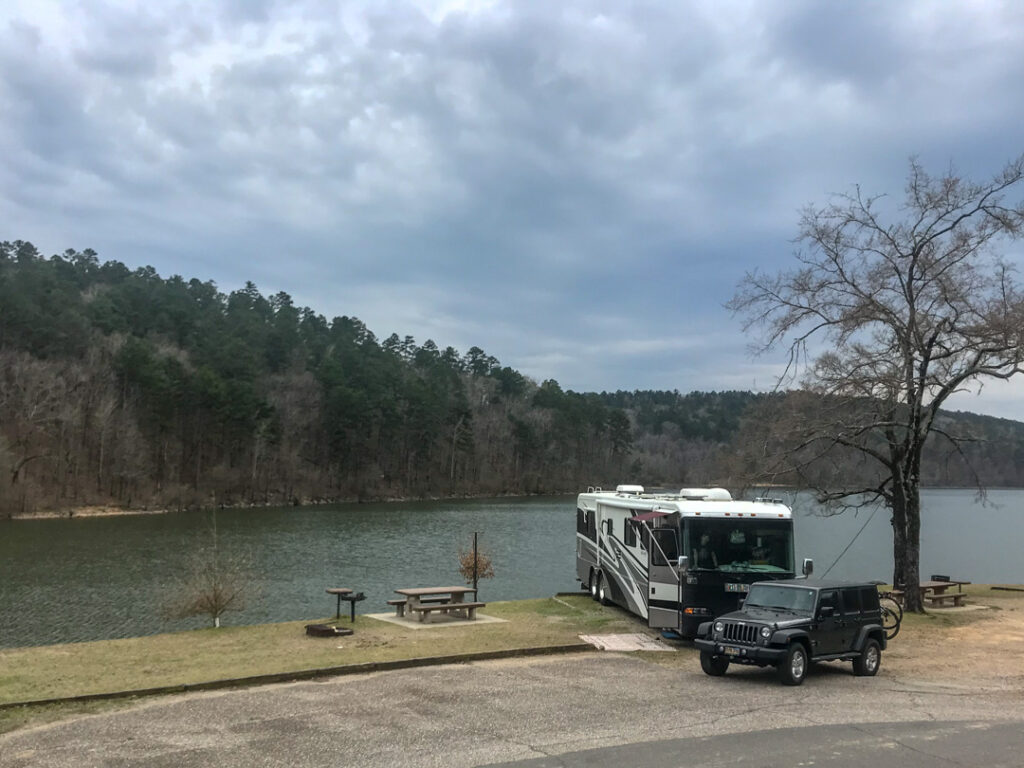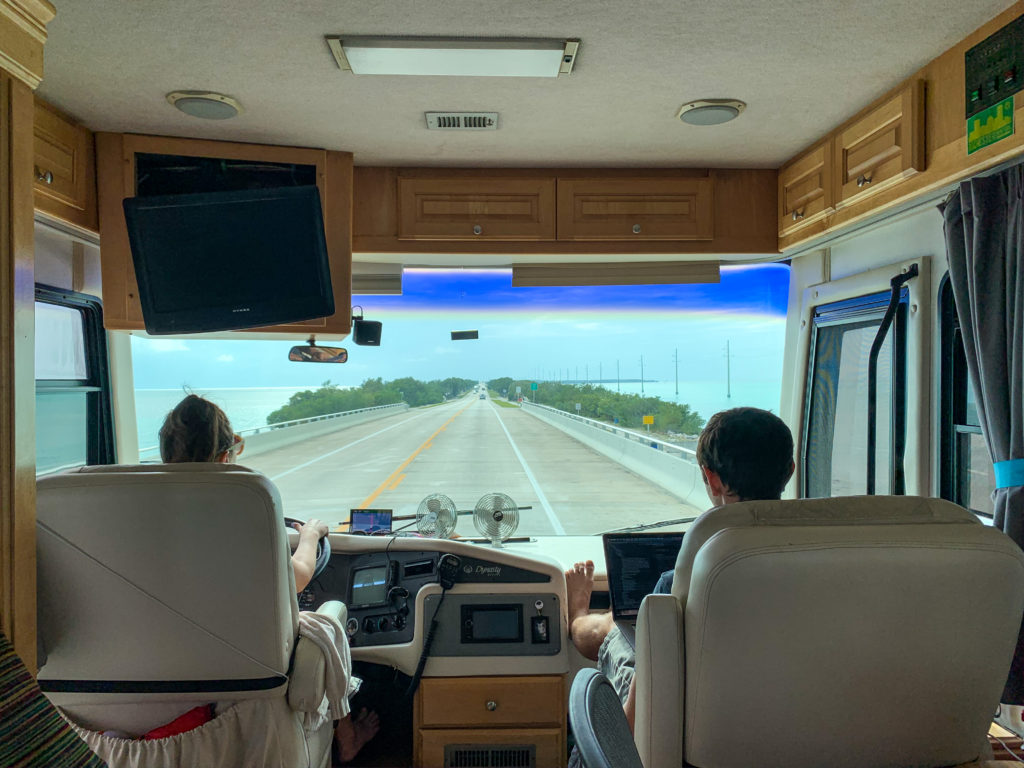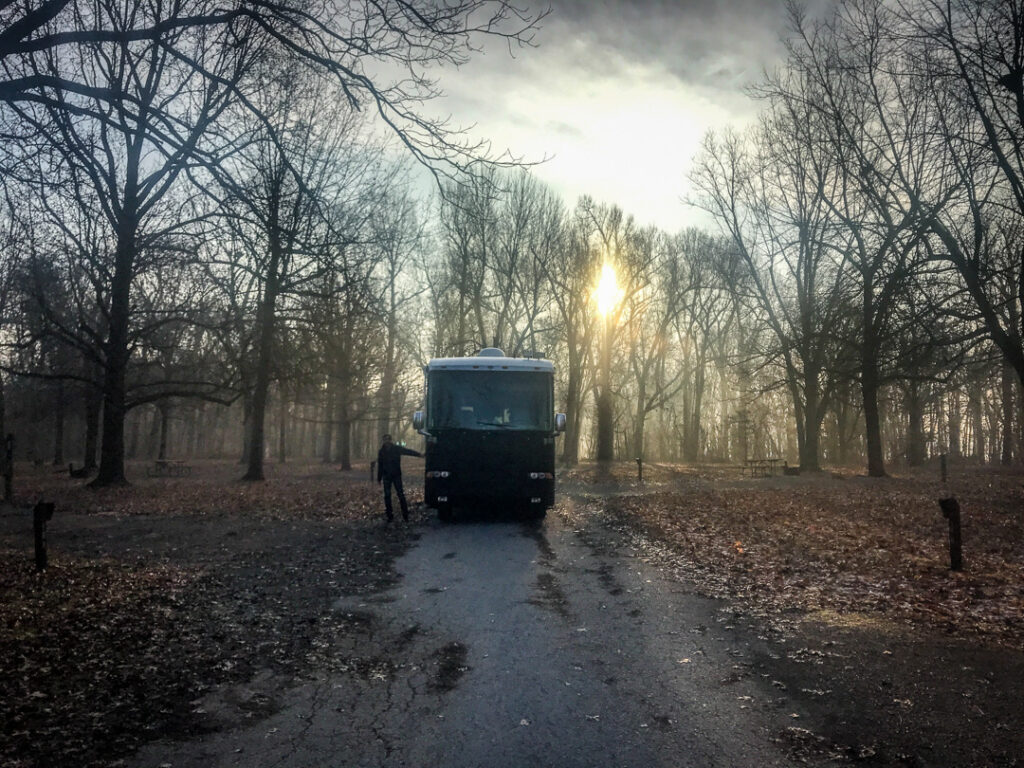
I expect it is not a completely uncommon topic of conversation amongst the nomadic RV set, or those who befriend them: “Sure, access to reliable healthcare is a doozy, but if there is ever a zombie apocalypse – this RV is going to be clutch for riding it out!”
Jake and I have held variations of this conversation amongst ourselves – with the added commentary of “you better come pick me up if there is a zombie apocalypse!” from friends when it’s discussed in a public setting.
We were clearly not taking all aspects of the reality of a global pandemic into consideration when we had these humor tainted chats. Nor were we thinking beyond a dread-filled fantasy that closely resembled something like what’s portrayed in an episode of The Walking Dead.
All it took was actually living a mobile lifestyle during global pandemic to squelch those fantasies back into their made for TV format.
On March 13th, New Mexico announced a full closure of their state park campground system. I think back now at the surprise that caused me – I was completely caught off guard.
What do you mean they are going to close campgrounds? What? Why? That’s crazy!
Except it wasn’t crazy. Considering that most people categorize campgrounds and camping lands as just ‘great places to recreate’, deeming them non-essential services feels okay. After some reflection from the ‘campgrounds are recreational’ theory, the variety of reasons for closing campgrounds – worker safety, local hospital capacity, ability to maintain a healthy staff to protect the parks, incentive to limit travel between places – make sense.
But what about the consideration that for a subset of the population, campgrounds, RV parks, and camping lands provide the literal foundation for our homes?
When your perspective shifts to that of a full-time nomad who utilizes a varying landscape of campground types as their full-time home – the argument for campgrounds being non-essential infrastructure gets murky. Many nomads do not own property beyond that with which they travel. They rely on the availability of public or private lands to provide a place to rest their wheels, set up solar panels or hook-up to electricity, and fill and dump their water.
Count us in that nomadic ‘no property’ set.
Worry regarding where we would and would not be able to live didn’t begin to bake for me until a few days after the initial New Mexico closures. While campground closures started as a trickle, by St. Patrick’s Day (March 17th), when libation fueled celebrations were mostly on pause – campground closures across the U.S. had begun to flow in.
We’ve been living nomadically for nearly five years. Instead of buying a home with a cement foundation, we spent our nest eggs on a 40×10 box on wheels. We drive from here to there, sometimes with a destination, often times without – choosing a new ‘front yard’ at each stop. Friends and acquaintances constantly reflect that we are living the dream. And they are right – we’re living our dream. For now, it feels right – and we’re damned lucky to be able to do it.
We’re used to uncertainty – heck, in our version of transiency, we typically have only a vague idea of where we’re headed or where we’ll plop our levelers down next until we are actively driving down a highway. We’re pretty damned flexible.
Watching our overnighting options dwindle with alarming speeds as campgrounds and public lands closed throughout the last weeks of March, we were introduced to a new nomadic reality: what happens if there is nowhere reasonable left for us to stay? Just how flexible were we going to have to get? And would flexibility even be a solution?
Cue full-blown anxiety.
We both work remotely. We’re computer commuters. I spend time contributing energy and customer service to Campendium, and also develop content and moderate social spaces for the Mobile Internet Resource Center. Jake, works remotely as a full-stack developer for a small company out of Virginia, and fixes all of the problems I run across in life. He doesn’t get paid for the latter commitment, but I would argue aggressively that the worth of that job is more commendable than can be rewarded with monetary restitution.
Working at Campendium became a focal point for me when the shut-downs began. Not only did having a focused viewpoint of the massive rush and inconsistency of camping land closures alert us to the reality of needing to start figuring out what the hell we were going to do personally, but I found tracking them to be a form of processing the larger pandemic event. Campground closures appeared to me to be a cross-section in grasping the larger crisis – which I felt overwhelmed by.
Sometimes a city would close their campgrounds – but only if the campgrounds were publicly managed. Meanwhile, the county next door to that city might close all privately managed campgrounds and RV parks in addition to publicly managed sites, but would allow those who were in place by the date of the closure to stay on site. A state away, an order would come down closing publicly managed and privately managed campgrounds – but also telling everyone on-site in one of those places to leave: a full eviction. Some parks stopped permitting new arrivals – reservations or not. National parks closed campgrounds park by park. States were closing state park campground systems – but sometimes only to tent campers. Some states or counties implemented short term stay bans – but permitted those who made reservations of fourteen days, or thirty days, to come stay at a private park.
In conversations with those who weren’t absorbed in the intricacies of camping land closures, I was noting strong correlations between the piecemeal buckling of the campground system and the wider shutdown of business and public amenities across the U.S.
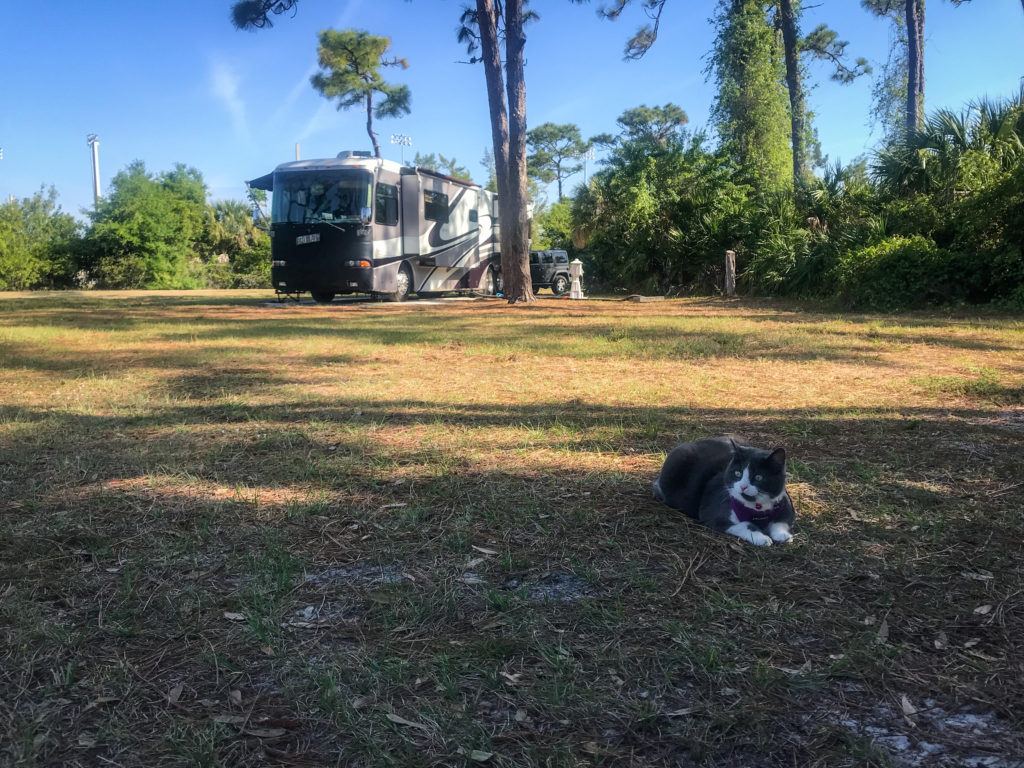
Ruminating over our options in yet another publicly managed campground in Florida which would not permit us to stay much longer.
By late March, we’d been evicted from Jonathan Dickinson State Park in Florida, and informed by an overpriced sardine-can-style private park where we found shelter right after that eviction that, once we left the property, we wouldn’t be permitted re-entry.
We didn’t want to stay in the overpriced sardine-can-style private park, which was about to get Florida summer style hot, and provided us with about 5-feet of space between our neighbor. We didn’t assess it to provide a great solution to the quandary of ‘where the hell should we ride this Novel Coronavirus Shitshow out’. But when you’re told that if you stay – you can stay, but if you leave – don’t come back… the narrowing of choices feels pressing.
We’d changed our typical travel style for our winter in Florida – where you all but need to have some sort of reservations to exist during snowbird season – and had made reservations through mid-April at various Sunshine State locales we wished to visit. By late March nearly all of our reservations, which were exclusively at publicly managed campgrounds, had been cancelled. To top that off, like the rest of the U.S., we couldn’t find any damned toilet paper.
Where would we go? What should we do?
For safety? Strategically? What could we afford? Where would be least likely to evict us again?
It was no longer about where would we like to go? For the first time since hitting the road in 2015, it felt like we were in survival mode.
By March 25th, 15% of the camping sites listed on Campendium had been closed due to the COVID-19 outbreak. By April 1st, 30% of camping sites were closed. As of April 20th, 46% of campsites listed on Campendium were closed. These closure numbers do not take into account seasonally closed camping areas – which further limits viability of options.
We finally decided to use our own personal ‘luck’ of still actively having incomes and prioritize finances behind the need to find somewhere to stay put that offered a low chance of eviction. We scoured Campendium for well-rated private RV parks in the mid-eastern portion of the U.S. I wasn’t interested in visiting the laundromat if I could help it – so we added water, sewer and electric hook-ups to our search. We further narrowed the options down by RV parks that were on state borders, with the thought process that if one state put strict RV park eviction mandates in place, we would be close to another state which would hopefully not have those strict measures.
We settled on a private park in a rural county in Virginia near a long biking trail. We called the owner and reserved a month long stay for $1,200, with the option to extend that stay. $1,200 for a campsite is more of a strain on our budget than we’re used to. However, placing ourselves in Virginia provides hope that we won’t roast to death by remaining in Florida in our not-well insulated wheeled-house if orders or recommendations of stagnancy extend into late spring, summer or beyond. We’re also within a day’s drive of family – should they need us.
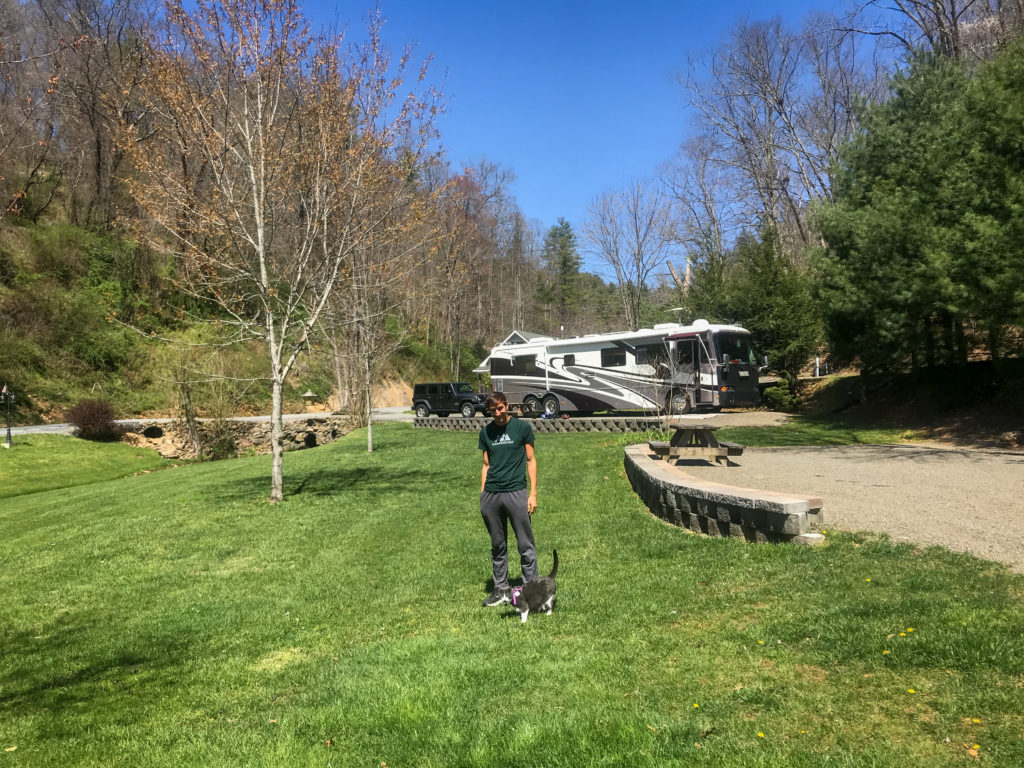
A pricey, but otherwise manageable (thus far) solution during a time of lots of unpalatable solutions.
It took Jake and I a few days of recouping in Virginia – downtime to release some of the the stress of evictions, and anxiety of loss of control paired with a two day long haul – to finally begin to reflect on the current state of nomadic life for ourselves, and others.
There is a large community of U.S. citizens who have chosen to forgo the allure of property – houses or land – for the chance to travel the country full time. This lifestyle comes with perks and drawbacks.
We typically have the ability to venture to new places whenever the fancy strikes – heading off-grid for solitude for days or weeks at a time. Or, we can choose to plant ourselves in a downtown RV park, with walking access to eateries and breweries. We cannot, however, legally purchase a firearm should we desire to do so, as we are one of the many nomads who call only a P.O. Box ‘home’. We forgo regular healthcare access by providers who we have built a relationship with. But we relish in the health enhancements that only a new-to-us running trail in a new-to-us area of the country can provide. We are constantly in a state of low-grade worry that our voting rights will, once again, be questioned. But we’re grateful that thus far, we’ve been permitted to vote absentee in every election.
As more viable sources of income are being fostered by online work capabilities, the nomadic lifestyle is becoming attainable for more people. It’s ‘the dream’ for many – but what happens when an invisible demon virus hijacks that dream?
Where is our place as full-time RVers, who spread ourselves – our money and energy – across the U.S.? Should we be afforded protections when we are choosing to utilize recreational facilities as our housing system? Should we be viewed – and treated differently from the community of recreational campers?
Jake and I have now spent many hours discussing the recent problems nomads have been saddled with. Our discussions have gotten lightly heated, as we vary in our opinions of what our own rights should be during this time of crisis.
We’ve read through countless threads on social media platforms that have grown explosively heated as full-time nomads and recreational campers have attempted to hash-out their frustrations and view points regarding campground closures.
While many states, counties, or federal agencies have passed eviction moratoriums during the pandemic – nomads seem rarely to be benefitting from those. Are we renters? Are we vacationers? Where in this gray area of a lifestyle do we fall?
We really are a varied group, us full-time nomads. Some of us own land – others don’t. Many of us work while traveling, others are retired, and still others are living off of savings, residual income, or nearly nothing at all. Some live ‘lavishly’, with the ability to pay for a campsite with a patio and pool when they desire. Others rely on free or cheap camping to exist. We require differing levels of amenities; the needs of nomads for access to water, electric, sewer or internet vary. We are old. Young. Middle aged. We live and travel solo, in partnerships, or with families. We travel at different speeds, stay in places for different lengths of time. We vote differently and the same – pray differently and the same. We spend different amounts of money in the places we travel – utilize different services. We have different goals and qualify our quality of life in different ways. But most all of us, like our sticks-and-bricks dwelling brethren, are feeling the impacts of the current pandemic. We feel it in novel ways – and similar ways.
I’ve watched from afar, virtually, as numerous nomads reported that they would be continuing to stay on, or were heading out to stay on, free public lands to ‘ride this out.’ Which concerned me. Public lands rarely have water access, or a place to dump used water or poop tanks. Many of the places these public lands exist in will soon grow unbearably hot (Arizona). These are circumstances which will almost certainly force a mass of nomads who – by situation or choice – have stayed on these lands, to move. Move to dump and fill their tanks. Move to new public lands because it’s either getting too warm or they are restricted by typical 14 day stay limits.
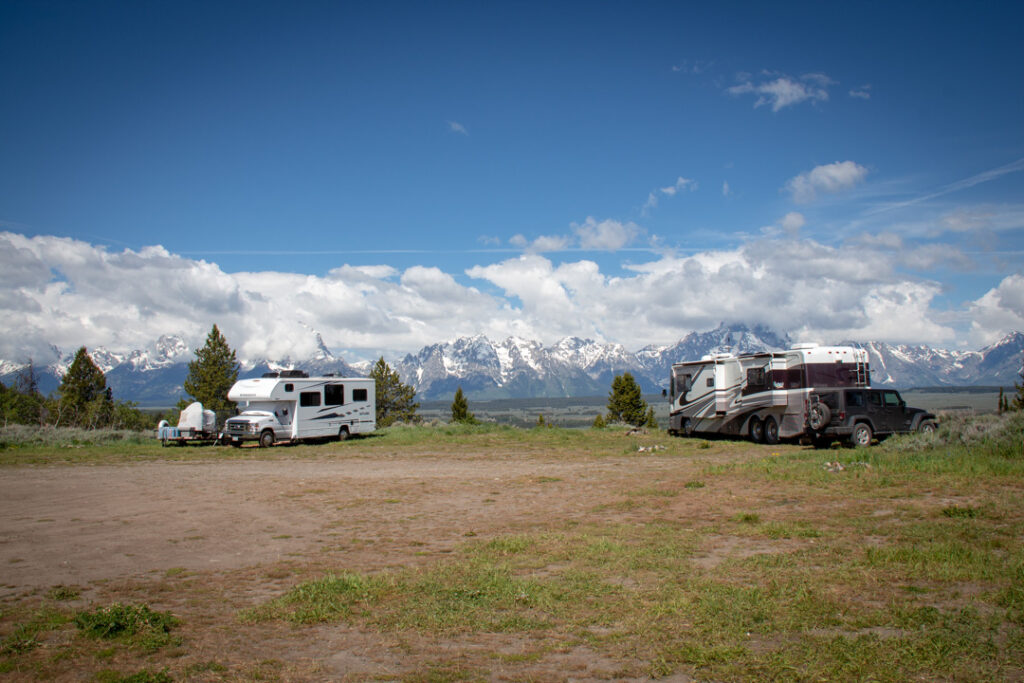
One overarching idea that unites us as a nomadic class: we move.
But right now – healthcare experts and most government officials are asking that the nation refrain from movement. We’ve been told to stay put – stay home. To incentivize that recommendation, many jurisdictions have, as previously detailed, limited access to tourism based services – including campgrounds.
But what happens when campgrounds are ‘home’? When your life is that of a perpetual tourist? When you desire to stay put – and not be virus vectors – but are being chased about by closures of safety providing campgrounds by well-meaning public officials? Or when your life circumstances prohibit you from affording the privilege of being able to stay at one of the dwindling number of campgrounds that are open?
By now, most of us nomads have figured out what to do in the short term. Many have ideas for the long term. But I already sense the dread of stagnancy. The lust for movement grows with each sunrise. While Jake and I are strong in our conviction to deny that desire, we have seen reports of folks resuming some semblance of transiency – whether by need, or just a theory of right.
I don’t have answers. And I will be the first to tell you – neither does Jake – because his answers don’t align perfectly with mine so they are very clearly wrong.
Our COVID story ranks on the ‘moderately inconvenient’ end of the spectrum in the grand scheme of things… but it’s ours. And writing it has helped me process the uncertainty fueled anxiety that it provoked.

